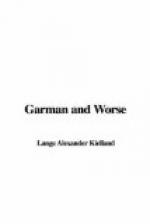Anders Begmand lived in the last of the little red-painted cottages which lay below the steep slope on the western side of the bay of Sandsgaard. The road along the shore was only a footpath leading to the door of each cottage, and then on to the next. Seaweed and half-decayed fish refuse lay on the shore, while at the back of the houses were heaps of kitchen refuse, and other abominations. The path itself consisted of a row of large stones, on which people had to walk if they wished to keep out of the accumulation of dirt. The houses were mostly crowded, but especially so in the winter, when the sailors were home from sea.
They were all in the employ of Garman and Worse, and the firm owned everything they possessed, even to their boats, their houses, and the very ground under their feet. When the boys grew old enough, they went to sea in one of the vessels belonging to the firm, and the brightest of the girls were taken into service, either at the house or at the farm. Otherwise the cottagers were left pretty much to themselves. They paid no rent, and there was no interference on the part of the firm with the “West End,” which was the name by which the little row of cottages was generally known amongst the workpeople.
Anders Begmand’s house was both the last and the smallest, but now that he was alone with his two grandchildren, Marianne and Martin, he did not require much room. Before, when his wife was alive, and they had three grown-up sons at home, one of whom was married, it was often close work enough; but now all were dead and gone. The wife lay in the churchyard, and the sons in the deep sea.
Anders was an old man, bent by age. His curly white hair covered his head like a mop, and stood out under his flat cap, which looked more like the clot of pitch it really almost was, than anything else. In his youth Anders had made one voyage to the Mediterranean, in the Family Hope, but he had then been discharged; for he had a failing, and that was—he stammered. Sometimes he could talk away without any hesitation, but if the stammering once began, there was nothing for it but to give up the attempt for that time. There he would stand, gasping and gasping, till he got so enraged that he nearly had a fit. When he was young it was dangerous to go near him at such times, for the angrier he got the more he stammered, and the more he stammered the more his anger increased. There was only one way out of it, and that was by singing; and so whenever anything of more than usual importance refused to come out, he was obliged to sing his intelligence, which he did to a merry little air he always used on these occasions. It was said that he had to sing when he proposed to his wife, but whether there was any truth in the statement is not quite clear. It was certain, however, that he did not often have to sing, and woe to any one who dared to say, “Sing, Anders.” This was, of course, when he was young; he was now so broken down that any one could




